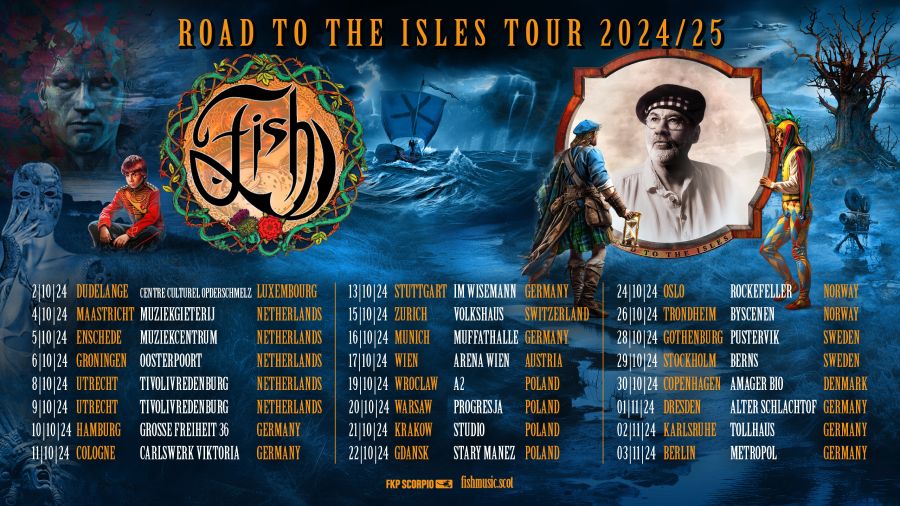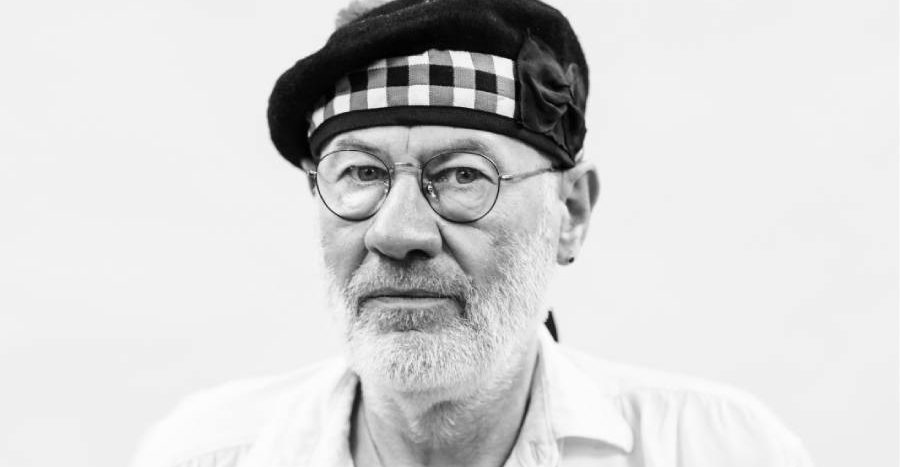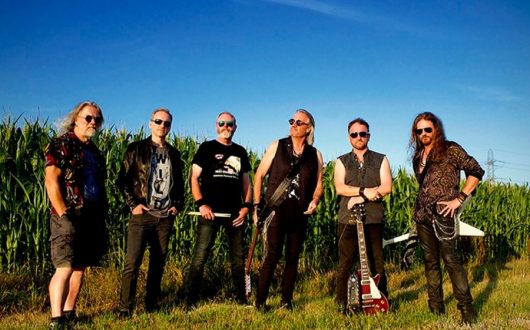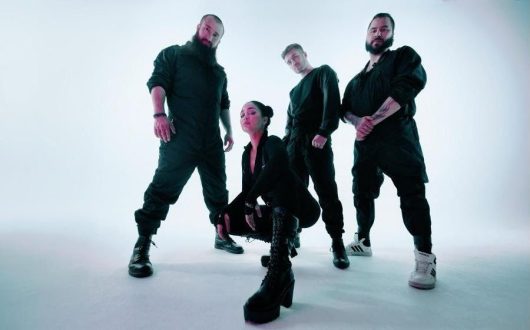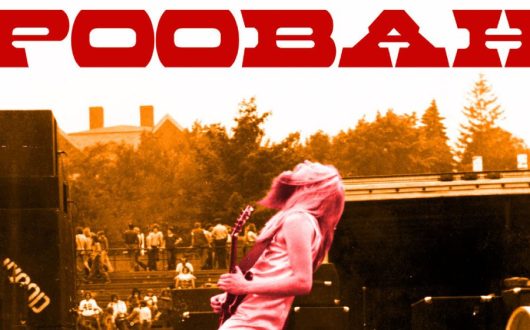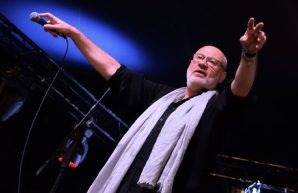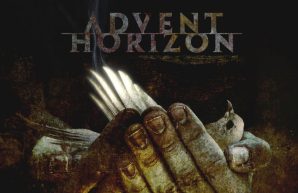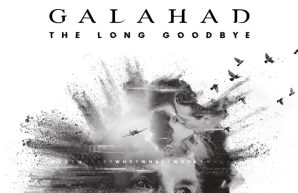Interview by Victoria Llewelyn
Scotland’s enigmatic poet and songwriter Fish is hitting the road in Europe later this year for the first part of what will be his final tour of live shows. There are big changes ahead for Fish, who currently lives in the farmhouse he bought in Haddington after splitting from Marillion in 1988, with his wife Simone. This may be ending a lengthy chapter of playing shows all over the world but – he insists – it is by no means closing the book.
Described as an ‘icon’ of the progressive rock genre, Fish broke boundaries by the dozen when he started out with his inimitable way of expressing himself through creative writing, greasepaint and sackcloth in the early days, a cryptic and sometimes perplexing personality, and a dogged determination to do his thing, his way. A lot of his writing has been semi-autobiographical – documenting turbulent times, expressing the purity of love, spitting out furious opinions on some of the evils of humanity, experiencing heartbreak and finding peace. His career may have seen peaks and troughs, but his music has always remained consistent, having released five albums with Marillion and eleven solo albums. Keen to describe himself as ‘a writer that can sing, not the other way around’ – Fish’s lyrics lend themselves perfectly to his fondness for a concept album, using his unique prose to tell an often-complicated story, adding another dimension to his music.
Onstage, he presents as boisterous, charming, merry and sometimes impulsive, going with ideas that seem to have just popped into his head at that moment. His voice remains as spellbinding as ever from gentle whispers to tumultuous cries and everything on the spectrum between. Everyone reaches their farewell tour at some point, but these are live shows that are going to be painfully missed.
MGM: The final tour – ‘Road To The Isles’ will be underway in Europe later this year – and it’s an extensive tour with dates across the UK and Europe. You’re doing shows almost daily for four weeks in Europe and as if that weren’t enough, you’ll then embark on a full set of UK dates in 2025 before leaving the stage for good. What’s behind the name – Road To The Isles – and why have you come to the decision that this is the right time to bow out?
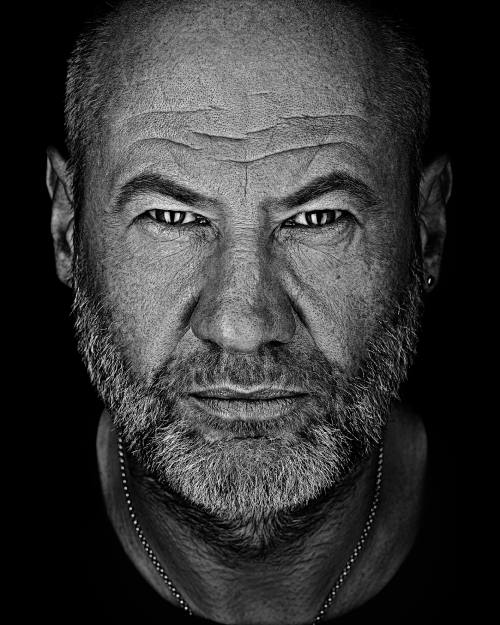
F: Victoria, I made a conscious decision to put in an end game a few years ago. I was having a lot of problems with my back, with my knees. I also recognised that unless I got incredibly lucky, I’m not going to get a single that’ll become a major worldwide hit anytime soon, right? I could write ‘My Way’ tomorrow and it wouldn’t be a hit! The reality is I’m never going to be playing arenas again, I’m never going to be in that touring comfort zone and I’m not wanting to be on tour bus for the rest of my life. I thought, you know what? It’s fun at the moment, but in five years’ time, it isn’t going to be fun, right?
All this should have been happened a year ago, when I decided that my touring days were over. My time on a tour bus, travelling about with a big electric band is done. Part of this touring endgame was to play the ‘Misplaced Childhood’ and ‘Clutching At Straws’ albums live, and then I was aiming to do this tour, but COVID happened just as we started and knocked the whole thing off. We lost 170 shows over the two years, and then we had Brexit as well, which was the killer blow at the back end of it all. It made me more focused on the end game, and I thought, I’ve got to get out now.
I think COVID taught me a lot; when everybody went from a foxtrot down to a waltz; we started looking at the world around us and paying attention to the minutia, and just letting the heart rate come down and just ‘being’. And then, when we went out on those dates in 2021, I didn’t really enjoy it because suddenly I was back there with a lot of people again. I got quite agoraphobic, I found it very stressful, I think because of the rules – it’s backstage area to bus to backstage area. No pubs, no restaurants, no going out, nothing.
It’s not the end. My creative energies will just get diverted into something else. I’m going to carry on writing. I might get involved with musical projects in years to come, but I’m just leaving the touring arena. When you say, ‘farewell tour’, it’s got this kind of great big…. It’s like gothic velvet drapes and candles about it! I’m not touring anymore, but that’s all! If you want to see me, this is the last time you’re going to get to see me with a full electric band.
‘Road To The Isles’ reflects our (Fish and Simone’s) future. My mother had been in care with us for four years, all the way through COVID, she was living here in the house, and she’s now moved to a home, last February. My wife moved across here after we got married in 2017, but this place has always been my place. My studio is here, I work from here. She’s made a great mark on it, but we’ve never had ‘our’ place, right?
We love gardening, and the garden we’ve got here – we live on a farm – it’s all higgledy-piggledy and strewn about. Also, there’s twelve and a half thousand more people in the Haddington area than there were twenty years ago! It’s the same everywhere. I didn’t want to become this little studio island in the middle of suburbia. So, we thought maybe we should think about moving, right? And with my mum going into the home and our kids all grown up, we had no ties.
MGM: Every Fish fan will be familiar with ‘The Funny Farm’, as you’ve always affectionately called it. You’ve run the ‘Funny Farm Kitchen Garden’ from there, produced all your music there, broadcast the hugely popular ‘Fish On Friday’ from there. I’m sure a big part of you will miss it, but what can you tell me about where you and Simone plan to move on to?
F: We were going to go across to have a look in Germany for a while, and a friend of mine, an artist who did actually the cover to ‘Songs From The Mirror’; he lives on an island called Berneray, in the Western Isles, in the Outer Hebrides. He’d been on at us to go up and see this place, come up, visit! You have to drive for five hours, you get the ferry across the waters, then there’s the causeway, it takes effort to get there! But, when we did, we fell in love with the Western Isles.
We drove up and down there for about two and a half weeks from Barra, and while we were there, a croft came on the market. We took over a 30 acre croft, right? We walk out our front door and we walk ten minutes across pasture and we’re on own white sand beach! If we walk from the croft to go the other way, we go across the hill, 40 minutes’ walk, we come onto another beach called the West Beach. And two weeks ago, on Lonely Planet, the West Beach was voted the most beautiful white sand beach in the world. Three and a half miles of white sand.
There’s 148 people on the island. That’s all. We’ve got this beautiful croft that we’ve been renovating, we’re moving up there this year and we already have 13 blackface lambs. They’ll go to the ram when we get back from the European tour. My wife has always wanted to run a small part time restaurant, and on the East Beach, where we are, there’s a couple of miles of white sand and a lot of visitors, kite surfers mostly, that like to come. Nobody’s allowed to stay overnight. We grow our own vegetables, so we’ll supply the cafe. I’ve got a small studio that I can actually write music in, or I can do podcasts, or I can do whatever. I’ve got an office above in the old 19th century croft house where I can sit and write my autobiography. And we’ve got our own house, we’re creating something together up there.
I might come off the island in years to come, when it gets too windy, rainy and dark, I might come off and do a couple of weeks of shows, but it’ll be either ‘An Evening With Fish’, or maybe a book reading, or I might do some acoustic stuff. But it won’t be a full electric band in a two-hour set. It won’t be that!
I think the industry has now changed so much that the only way you can really make serious money nowadays is to go on the road and play live. There’s more money in sheep now than Spotify!
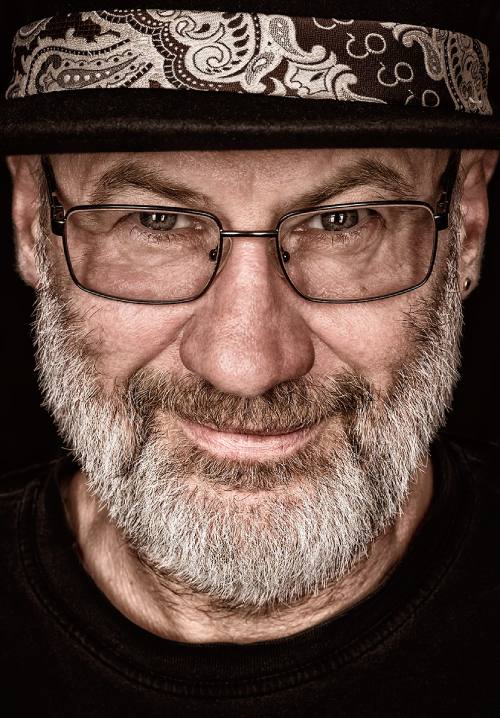
MGM: You’ve always been someone that’s appreciated your solitude at times and are known to have a great love of the natural world and the outdoors. It sounds like this place really speaks to you in a special way, but at a crossroads in your life where you could have gone anywhere what made you so certain it was the right place to head for?
F: We actually bought the croft at the beginning of last year and we started renovating in September. You may think this is strange Victoria, right, but I’m a big believer in signs. There’s a very old Scottish saying – ‘What’s meant for you will no pass you’. My wife said to me the first time we were up, she said, I’ve never known you so peaceful and so relaxed ever as you were on the island, and that’s what I need nowadays in my life.
We’ve got so many friends there already and it’s the sense of community that I really love, and I missed, as well as the sense of peace. When we went up last, we went to a Ceilidh – I’d never been at a Ceilidh in my life, apart from in High School, right? Which was basically a bunch of Scottish Highland dancing and that’s it – that was what I thought Ceilidh was. This was so different! It’s a coming together of people. It’s a party, but its poetry, its drinking, its music, its everything, right? And it’s brilliant! I’m meeting all these total strangers and making these great friendships.
I was standing outside, with my wife, a couple of pals, and I’m talking to this girl. I said to her, what’s your name? Then she goes, Kayleigh! I said, are you kidding me? I’m meeting Kayleigh! Kayleigh! I said, was your Dad a Marillion fan? She said, no, my Mum was! She used to fancy the singer! This is a sign, right? Then when we got the croft, there’s a little loch at the back. There’s a hill at the back there’s two pair of golden eagles nest up there, and there’s a freshwater loch at the bottom, fed by the burn that comes down off the hill. We didn’t know what it was called, and there was a map of the island in the bistro, which is just down the road, it’s got the loch and it’s called the Tara loch. Simone and I both have daughters named Tara.
Everything came together – we came back home; we were trying to think – how will we pay for this? How are we going to get this sorted out? And when we arrived back, we got an offer in for an asset, right? On my wife’s birthday. Suddenly, we can do it. All the signs are there.
I had my palm read way back, before I joined Marillion. I’m not totally into the whole medium thing but I respect it, right? So, I had a palm reading before I joined, before I became a singer, when I was in forestry. And the guy said, you’ll have three careers in your life. He said, the first one, you’re in now and you’re going to leave it very soon. You’re going to move to something you never thought you would ever do, and it’s got nothing to do with your first career. This second career will make you relatively world famous, you’ll fall into it and things will happen. This career will go on a long time, but, he said, then another one happens. When the next one happens, he said, the signs will come along, and you’ll know what to do. When things start to go wrong in some areas, then they start to push you into what you should be doing in the third one. And that’s what’s happening now; that’s what’s happened in the last three years. But the strange thing was, he said that the third career, and this is what I don’t get. He said, it’ll make you more famous than the second one.
I don’t get how sheep farming is going to do that!
My wife had a friend down in Munich who’s a medium, when we were really wondering, what do we do? Do we move? Do we leave this place? Right? We thought, let’s do a reading. Now this is before we ever went up to the island, and he said, I see a place with a beach, and there’s big hill and there’s sea and he described it just like it is. He said a couple of things about my career as well. It’s really interesting.
MGM: Let’s talk about that second career for a bit. You joined Marillion in 1981 and saw huge international success with the band until splitting from them in 1988. Your solo career took off almost immediately afterwards with the release of your debut ‘Vigil In A Wilderness Of Mirrors’ in 1990. Eleven studio albums and countless live performances since, when you look back over all those years what stirs your memories? Where were the high points and the low points and is there anything you wish had been different?
F: When I left Marillion, there were a lot of people that wanted to see me fall, right, I remember, they really wanted to see me fuck up. So, putting ‘Vigil’ together was a big high. I just started a major litigation against EMI records, and I decided I was going to build a studio and finance that and sign all the contracts off. Then, my wife told me that she was pregnant. HAHA!
This studio became the backdrop for the ‘difficult second album’ which was ‘Internal Exile’. I started to write about this for the autobiography. The opening line is something like – I thought the difficult second album only happened once in your career. I did realise it happened with your solo career as well!
Right where I’m sitting now became the control room for it all. I fought for this studio through a divorce, it’s been the saviour through everything. Then it became a concrete albatross around my neck. Now it’s the saviour again because what’s happening here just now is what’s enabling us to build our life on the island.
With highs and lows, it’s difficult to plot them out because the whole thing is a journey, it’s a continual movement. Going out to Bosnia was an incredible high. There’s been some really dark times, but if I hadn’t had them, I wouldn’t be here now, because I’ve learned from them all. I still get asked if I regret leaving Marillion. Absolutely not. Right? Because if I’d stayed in Marillion, I would have had a really boring straight-line graph. It would have been rubbish. So, no, I can’t say there’s anything I would have done different. It’s all part of the journey.
I didn’t start singing until I was 21, 22. I wasn’t the Robert Plant model, singing in blues bands from my teens. I’m very unlikely, as I’ve always said to people – I’m basically a writer who can sing. I’m not a singer. Writing is what I do, and the fact that I can sing is a bonus, because then I’ve got a way of expressing it. And music is a vehicle for the words. It always has been. That’s why I think my style, my musical style is such.
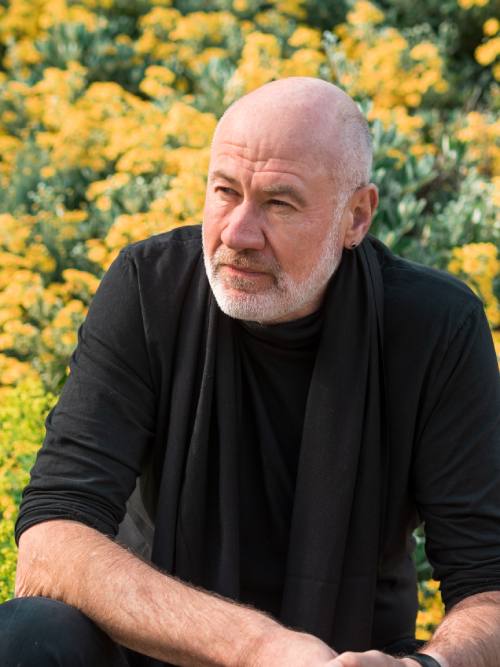
MGM: That writing is very unique to you, it’s poetry, prose with the old-fashioned air of the troubadour around it. Your musical style might be rooted in the prog genre, but you have a way of composing lyrical content with a depth of feeling that exceeds this. Where do you think this comes from?
F: I actually realised, fairly recently, that I’m on the (autistic) spectrum. I write because I find it difficult to express myself in conversation. If I get in an argument with somebody, I get very frustrated, and I can become overwhelmed by things that are coming at me and I retreat. I’m renowned for writing letters to people. I will sit and put everything in words and that’s where I retreat, where I make sense of my world. My whole career is basically taking my spectral energies and throwing them into albums. That’s where it is. I didn’t know it for what it was, but I saw a refuge in words years ago and that’s where I went to handle my problems. A relationship breaks up, I solve it and put in a box. But I never realised how deep that went.
I have to meticulously write all my feelings and sculpt all those feelings and angles and things down into words That’s what helps me deal with things, in the main. That in itself tells you that I’m never going to stop writing!
MGM: Going back to ‘Road To The Isles’, part of the end game plan includes the re-release of remastered versions of ‘Vigil’ and ‘Internal Exile’, which will be available in the next few months. Add that to the tour rehearsals, management, planning and everything else, you have a lot of plates spinning just now.
F: They should have been out two years ago, Victoria! They got stalled for so many reasons. Last year we had some chaos with the vinyl release which should have been sorted out back then. It’s just Simone and I; we are the record company, that’s how we do things now. I don’t have an organisation, I don’t have five or six guys that I can say, well, you collect the photographs and if you assemble this and you write up the sleeve notes and stuff, I’ve got to do all that myself. Right? When something like the chaos of the vinyl happened last year, and the whole thing went kaboom, everything that we were doing got put back and now we’re aiming to get them out at the end of April. I’ve got to be out of this house and on the road by September, so we’ve got to hit this window! Stress is through the roof at the moment!
We’re dealing with the renovation at the croft, and the sale of the house at the same time, but I thrive on it to some degree. I’m used to working at this tempo. I’m a bit like a silver surfer – as long as I stay on top of it and I can guide it, and as long as I don’t put my head into the shit and start going into the real extreme detail, I’m good. Because when I do that, then the autism kicks in and then I get overwhelmed. I’ve got to try and stay on top, I’ve got to focus and just glide all the way through, keep an eye on everything and deal with it all. Focus on the end game because I know that by the time we land at the end of the UK tour next year, it’s all in place. The croft is in place, the studio is gone. We are in the next part of my life at that point. And that’s why I decided, stop smoking, stop drinking, stay focused.
MGM: The musicians that are coming out on tour with you – all people you’ve worked extensively with previously, but you have worked with a plethora of incredibly talented musicians over the years. How did you decide who you wanted to take with you?
F: I was going through the demos of ‘Internal’ and ‘Vigil’ for the new remasters you mentioned, Victoria, that are coming out at the end of April. I’m sitting here in this room about to leave it in a few months, going through all this material and listening to all those early demos with Mickey (Simmonds, keyboards) and Robin (Boult, guitar) and the magic that was around at that time. So, when we were putting the band together for the farewell tour, I thought, well, who do we know? I got that feeling of those Hollywood movies, like The Expendables, ‘we got one more heist in us’, right? It’s like Sean Connery and John Malkovich and Helen Mirren! Why don’t we phone up the old guys, why not?
Mickey and I have been friends for years, Mickey was there when I made that big jump from Marillion into the solo career, right at the very start, he was involved with writing ‘Vigil’ and ‘Internal Exile’. Steve Vantsis (bass) has been my right-hand man for years now, he co-wrote ‘Feast Of Consequences’. I phoned up Mickey, and Mickey said, yeah, he’ll do it. I phoned up Robin and Robin said he’d do it. Come on, let’s go for it. And it’s got to be fun. This is one of the really important things, Victoria, I think with touring, it’s got to be fun, right? I don’t mean getting smashed or going crazy every night or partying down all the time. It’s got to be a fun experience with good individuals, with characters where there’s a great mix in people’s chemistry, right? Otherwise, it can become really humdrum. It becomes a chore.
It’s got to be with the right guys for the right length of time, right? I’ve been out on the road in Germany, I’ve gone in a venue, and I’ve seen a poster of an artist. Who’s on the ‘farewell tour.’ And I’ve gone back the following year, right? It’s the same artist doing the same farewell tour. I refuse to do that. The European tour is October till mid-November, the UK tour is only a slice of February, March, and then I’m out. That’s it.
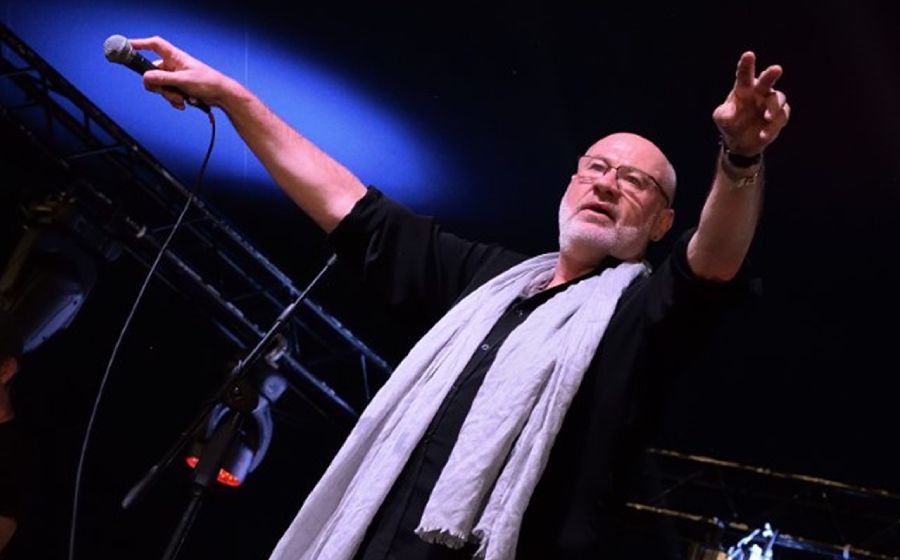
MGM: What, if anything, are you going to miss, once you’re done touring for good and finally living on the isle?
F: Probably a curry! Nothing, In all honesty. There’s going to be certain bits and pieces about this place – I’m going to miss the studio, but at the same time I’m cutting a cord and letting go of a lot of stuff here as well. I moved up here in 88. There’s a lot of baggage in this building that I want to leave behind. Some of it I can take, and I’ll wrap it up in the autobiography and I’ll send it loose. But there’s a lot I want to leave here. It means, for Simone and I, it’s a new start to our lives and it’s the right time. We both felt that we’ve got one big adventure left in us and this is the big adventure.
FISH will be on ‘The Road To The Isles’ tour in the UK in February and March 2025.
